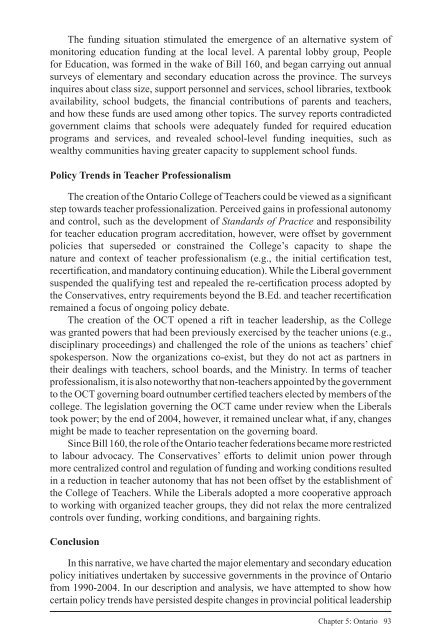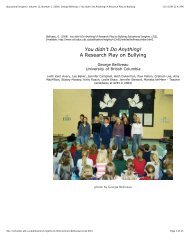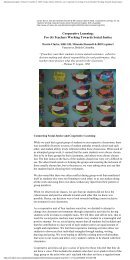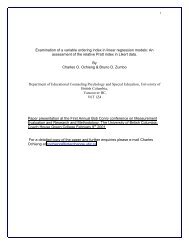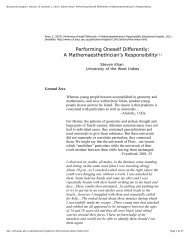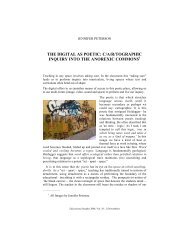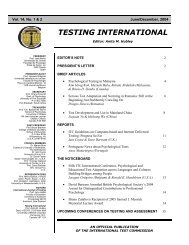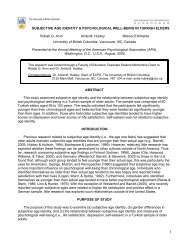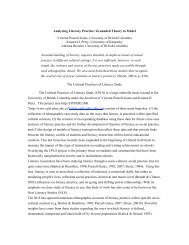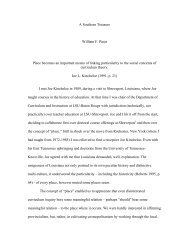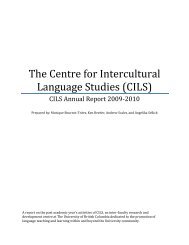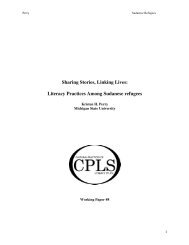The evolution of professionalism - Centre for Policy Studies in ...
The evolution of professionalism - Centre for Policy Studies in ...
The evolution of professionalism - Centre for Policy Studies in ...
You also want an ePaper? Increase the reach of your titles
YUMPU automatically turns print PDFs into web optimized ePapers that Google loves.
<strong>The</strong> fund<strong>in</strong>g situation stimulated the emergence <strong>of</strong> an alternative system <strong>of</strong><br />
monitor<strong>in</strong>g education fund<strong>in</strong>g at the local level. A parental lobby group, People<br />
<strong>for</strong> Education, was <strong>for</strong>med <strong>in</strong> the wake <strong>of</strong> Bill 160, and began carry<strong>in</strong>g out annual<br />
surveys <strong>of</strong> elementary and secondary education across the prov<strong>in</strong>ce. <strong>The</strong> surveys<br />
<strong>in</strong>quires about class size, support personnel and services, school libraries, textbook<br />
availability, school budgets, the fi nancial contributions <strong>of</strong> parents and teachers,<br />
and how these funds are used among other topics. <strong>The</strong> survey reports contradicted<br />
government claims that schools were adequately funded <strong>for</strong> required education<br />
programs and services, and revealed school-level fund<strong>in</strong>g <strong>in</strong>equities, such as<br />
wealthy communities hav<strong>in</strong>g greater capacity to supplement school funds.<br />
<strong>Policy</strong> Trends <strong>in</strong> Teacher Pr<strong>of</strong>essionalism<br />
<strong>The</strong> creation <strong>of</strong> the Ontario College <strong>of</strong> Teachers could be viewed as a signifi cant<br />
step towards teacher pr<strong>of</strong>essionalization. Perceived ga<strong>in</strong>s <strong>in</strong> pr<strong>of</strong>essional autonomy<br />
and control, such as the development <strong>of</strong> Standards <strong>of</strong> Practice and responsibility<br />
<strong>for</strong> teacher education program accreditation, however, were <strong>of</strong>fset by government<br />
policies that superseded or constra<strong>in</strong>ed the College’s capacity to shape the<br />
nature and context <strong>of</strong> teacher pr<strong>of</strong>essionalism (e.g., the <strong>in</strong>itial certifi cation test,<br />
recertifi cation, and mandatory cont<strong>in</strong>u<strong>in</strong>g education). While the Liberal government<br />
suspended the qualify<strong>in</strong>g test and repealed the re-certifi cation process adopted by<br />
the Conservatives, entry requirements beyond the B.Ed. and teacher recertifi cation<br />
rema<strong>in</strong>ed a focus <strong>of</strong> ongo<strong>in</strong>g policy debate.<br />
<strong>The</strong> creation <strong>of</strong> the OCT opened a rift <strong>in</strong> teacher leadership, as the College<br />
was granted powers that had been previously exercised by the teacher unions (e.g.,<br />
discipl<strong>in</strong>ary proceed<strong>in</strong>gs) and challenged the role <strong>of</strong> the unions as teachers’ chief<br />
spokesperson. Now the organizations co-exist, but they do not act as partners <strong>in</strong><br />
their deal<strong>in</strong>gs with teachers, school boards, and the M<strong>in</strong>istry. In terms <strong>of</strong> teacher<br />
pr<strong>of</strong>essionalism, it is also noteworthy that non-teachers appo<strong>in</strong>ted by the government<br />
to the OCT govern<strong>in</strong>g board outnumber certifi ed teachers elected by members <strong>of</strong> the<br />
college. <strong>The</strong> legislation govern<strong>in</strong>g the OCT came under review when the Liberals<br />
took power; by the end <strong>of</strong> 2004, however, it rema<strong>in</strong>ed unclear what, if any, changes<br />
might be made to teacher representation on the govern<strong>in</strong>g board.<br />
S<strong>in</strong>ce Bill 160, the role <strong>of</strong> the Ontario teacher federations became more restricted<br />
to labour advocacy. <strong>The</strong> Conservatives’ ef<strong>for</strong>ts to delimit union power through<br />
more centralized control and regulation <strong>of</strong> fund<strong>in</strong>g and work<strong>in</strong>g conditions resulted<br />
<strong>in</strong> a reduction <strong>in</strong> teacher autonomy that has not been <strong>of</strong>fset by the establishment <strong>of</strong><br />
the College <strong>of</strong> Teachers. While the Liberals adopted a more cooperative approach<br />
to work<strong>in</strong>g with organized teacher groups, they did not relax the more centralized<br />
controls over fund<strong>in</strong>g, work<strong>in</strong>g conditions, and barga<strong>in</strong><strong>in</strong>g rights.<br />
Conclusion<br />
In this narrative, we have charted the major elementary and secondary education<br />
policy <strong>in</strong>itiatives undertaken by successive governments <strong>in</strong> the prov<strong>in</strong>ce <strong>of</strong> Ontario<br />
from 1990-2004. In our description and analysis, we have attempted to show how<br />
certa<strong>in</strong> policy trends have persisted despite changes <strong>in</strong> prov<strong>in</strong>cial political leadership<br />
Chapter 5: Ontario 93


